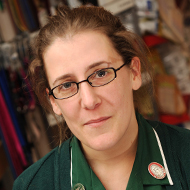
Nicola Lakeman RVN discusses overcoming adversity to achieve goals.
The BVNA 2022 Congress took place in Telford over the weekend (7-9 October), kicking off with an insightful session on positive psychology and emotional wellbeing.
The three-day conference included a packed scientific programme of lectures, an exhibition, an awards ceremony, and a chance to catch up with friends and colleagues at the famous dinner dance event. The overarching theme was resiliency, which was central not only to talks about positive psychology and moral resilience, but also to clinical behaviour.
Resilience can be defined as a person's ability to successfully adapt to a difficult situation - and it's certainly a term familiar to the veterinary profession. Workforce shortages continue to be a huge problem facing the sector - and the impact of the COVID-19 pandemic and its associated restrictions have only exacerbated this issue, not to mention a host of other challenges.
This sentiment was echoed by head veterinary nurse Nicola Lakeman in her raw and insightful keynote speech on the first day of BVNA Congress. "Vet nurses are resilient," she said. "We're superb at adapting and we're good at always doing our best, even when we feel like we don't necessarily do our best. We always do better together, and asking for help is probably one of the most difficult things.”
Nicola's keynote, entitled Building Resilience, explored how her life experiences have helped shape the person she is today and offered some tips that delegates can implement into their lives to become more resilient.
As a highly-respected veterinary nurse, Nicola is renowned for her work within animal nutrition and nursing clinics, has won several prestigious awards, and recently achieved a Master's Degree in Advanced Veterinary Nursing. Yet despite all this, her journey has not been without its challenges, and Nicola sadly knows all too well about what it means to be resilient.
Nicola talked candidly about hurdles she had to overcome to achieve her dream career, from failing to attain the A-levels required to get into veterinary school to being unable to secure a veterinary nursing placement, all while coping with pain caused by a chronic illness. She also talked openly and honestly about some of the more personal setbacks she has faced, including close family bereavements, the devastating loss of her baby and failing the second year of her Master's degree.
Nicola said of her experiences: “Yes, I get to the top of the mountain. Yes, I passed my Masters. But if it wasn't for certain people at key points pushing me up the hill, I wouldn't have got there. Everyone that knows me says oh my god, you're so resilient - and maybe I am. But if it wasn't for those people around me, I wouldn't have been able to do any of that – and that's what I think resilience is about.”
Nicola discussed resilience strategies in the face of short-term and long term-change, stressing that while it is good to build up short-term resilience (for example, having a plan to get through a 12-hour shift), long-term, you don't have to be resilient. She gave the example of working in a practice you don't like, adding: “adaptation also includes walking around the brick wall or even knocking the brick wall down. You don't have to stay there and keep banging your head.”
On building resiliency, Nicola concluded her keynote by urging delegates to prioritise, pick their battles and pick practical goals – even if the goal is to maintain the status quo.She also offered tips to help others, such as giving positive feedback and telling somebody when they have done a great job. “You affect other people's resilience,” she said. “Small things really do make a difference.”



 The Federation of Independent Veterinary practices (FIVP) has announced a third season of its podcast, Practice Matters.
The Federation of Independent Veterinary practices (FIVP) has announced a third season of its podcast, Practice Matters.